Richard Bach - The Bridge Across Forever
VIP免费
2024-12-12
1
0
390.11KB
148 页
5.9玖币
侵权投诉
ONE
She'll be here today. I looked down from the cockpit, down through the wind
and propeller-blast, down through half a mile of autumn to my rented hayfield,
to the sugar chip that was my FLY-$3-FLY sign tied to the open gate. Both
sides of the road around the sign were jammed with cars. There must have been
around sixty of them, and a crowd to match, come to see the flying. She could
be there this moment, just arrived! I smiled at that. Could be!
I throttled the engine to idle, pulled the nose of the fleet plane higher, let
the wings stall. Then stomped full rudder, full left rudder, and jammed the
control stick back.
The green earth, harvest corn and soybeans, farms and meadows calm at noon,
the bottom dropped out and they exploded in the whirling blur of an airshow
tailspin of what would look from the ground like an old flying-machine
suddenly burst out of control.
The nose slammed down, the world spun into a color-streak tornado wrapping
faster and faster around my goggles.
How long have I been missing you, dear soulmate, I thought, dear wise mystical
lovely lady? Today at last, coincidence will bring you to Russell, Iowa, take
you by the hand, lead you to that field of alfalfa hay, down there. You'll
walk to the edge of the crowd, not quite knowing why, curious to watch a page
of history still alive, bright paints spinning in the air.
The two-winger twisted down thuddering, kicking against me on the controls for
a thousand feet, the tornado going steeper and tighter and louder every
second.
Spin ... till ... Now.
I pushed the stick forward, came off the left and stood hard on the right
rudder pedal. Blurs going tighter, quicker, one, two times around, then the
spin quit and we dived straight down, fast as we could go.
She'll be here today, I thought, because she's alone, too. Because she's
learned everything she wants to learn by herself. Because there's one person
in the world that she's being led to meet, and that person right now is flying
this airplane.
Tight turn, throttle back, switch off, propeller stopped . . . glide down,
float soundlessly to land, coast to stop in front of the crowd.
I'll know her when I see her, I thought, bright anticipation, I'll know her at
once.
Around the airplane were men and women, families with picnic baskets, kids on
bikes, watching. Two dogs, near the kids.
I pulled myself up from the cockpit, looked at the people and liked them. Then
I was listening to my own voice, curiously detached, and at the same time I
was looking for her in the crowd.
"Russell from the air, folks! See it floating adrift on the fields of Iowa!
Last chance before the snows! Come on up where only birds and angebfly. ..."
A few of the people laughed and applauded for somebody else to be first. Some
faces suspicious, full of questions; some faces eager and adventurous; some
pretty faces, too, amused, intrigued. But nowhere the face I was looking for.
"You're sure it's safe?" a woman said. "After what I saw, I'm not sure you're
a safe driver!" Suntanned, clear brown eyes, she wanted to be sold on this.
"Safe as can be, ma'am, gentle as thistledown. The Fleet here's been flying
since December twenty-fourth, nineteen twenty-eight-she's probably good for
one more flight before she goes to pieces. ..."
She blinked at me, startled.
"Just kidding," I said. "She'll be flying when you and I are years gone, I
guarantee you that!"
"I'd guess I've waited long enough," she said. "I've always wanted to fly in
one of these. ..."
"You're going to love it."
I swung the propeller to start the engine, showed her the way to the front
cockpit, helped her with the safety-belt.
Impossible, I thought. She's not here. Not-here is not possible!
Every day convinced today's-the-day, and every day wrong!
The first ride was followed by thirty other rides, before the sun went down. I
flew and talked till everyone went home to supper and to their nights with
each other and left me alone.
Alone.
Is she fiction?
Silence.
A minute before the water boiled, I took the pan from my campfire, tapped in
hot-chocolate mix, stirred it with a hay-stem. Frowned, talked to myself.
"I'm a fool, to look for her out here."
I poked last week's cinnamon-roll on a stick, toasted it over shreds of fire.
This adventure, barnstorming through the 1970s with an old biplane, I thought.
Once it was spiced with question-marks. Now it's so known and safe I might as
well be living in a scrapbook. After the hundredth tailspin I can do them with
my eyes closed. After searching the thousandth crowd, I'm beginning to doubt
that soulmates appear in hayfields.
There's enough money, passenger-hopping, I'll never starve. But I'm learning
nothing new, either, I'm hanging on.
My last real learning happened two summers before. I had seen a white-and-gold
Travel Air biplane, another barnstormer in a field, had landed and met Donald
Shimoda, retired Messiah, ex-Saviour-of-the-World. We became friends, and in
those last months of his life he had passed along a few secrets of his strange
calling.
The journal that I kept of that season had turned into a book sent oif to a
publisher and printed not long ago. I practiced most of his lessons well, so
new tests were rare indeed, but the soulmate problem I couldn't solve at all.
Near the tail of the Fleet, I heard a low crackling; stealthy footsteps
crunching in the hay. They stopped when I turned to listen, then crept slowly
forward, stalking me.
I peered into the dark. "Who's there?"
A panther? A leopard? Not in Iowa, there haven't been leopards in Iowa since .
. .
Another slow step in the night hay. It's got to be ... A timber-wolf!
I dived for the tool-kit, grabbed for a knife, for a big wrench, but too late.
In that instant around the wheel of the airplane popped a black-and-white
bandit's mask, bright eyes studying me, furry whiskered nose sniffing
inquisitively toward the grocery-box.
Not a timber-wolf.
"Why . . . why, hello there . . ."I said. I laughed at my heart, pounding so,
and pretended I was putting the wrench away.
Baby raccoons, rescued and raised as pets in the Midwest, are set free when
they're a year old, but pets they are ever after.
There's no wrong, is there, in crackling through the fields, in stopping by
after dark to ask if a camper might have, oh, a little something sweet to
nibble on, while a night slows by?
"That's OK . . . c'mon, c'mon little fella! Hungry?"
Any little sweet thing would be fine, a square of chocolate or ...
marshmallows? I can tell you have marshmallows, The raccoon stood on its hind
feet for a moment, nose twitching, testing the air food-ward, and looked to
me. The rest of the marshmallows, if you won't be eating them yourself, they'd
be fine.
I lifted the bag out, poured a pile of the soft powdery things on my bedroll.
"Here y'go . . . come on. ..."
Settling noisily to dessert, the mini-bear stuffed marsh-mallows into its
mouth, chomping them in happy appreciation.
It declined my homemade panbread after half a bite, finished the marshmallows,
downed most of my honeyed puffed-wheat, lapped the pan of water I poured. Then
it sat for a while, watching the fire, sniffed at last that it was time to be
moving on.
"Thanks for stopping by," I said.
The black eyes looked solemnly into mine.
Thank you for the food. You're not a bad human. I'll see you tomorrow night.
Your panbread is awful.
With that the fluffy creature trundled away, ring-striped tail disappeared
into the shadows, steps crunching fainter and fainter through the hay, leaving
me alone with my thoughts and the wish for my lady.
It always comes back to her.
She is not impossible, I thought, she is not too much to hope for!
What would Donald Shimoda tell me, if he were sitting here under the wing
tonight, if he knew I hadn't found her yet?
He'd say something obvious, is what he'd say. The strange thing about his
secrets was that every one of them was simple.
What if I told him I'd failed, searching for her? He'd study his cinnamon-roll
for inspiration, he'd run his fingers through his black hair and he'd say,
"Flying with the wind, Richard, from town to town, has it occurred to you
that's not a way to find her, that's a way to lose her?"
Simple. And then he'd wait without a word for whatever I had to answer.
I would have said to that, if he were here I would have said, "OK. Flying over
horizons is not the way. I give up. 'Tell me. How do I find her?"
He'd narrow his eyes, annoyed I'd ask him instead of myself.
"Are you happy? Are you doing, this moment, exactly what you most want to do
in the world?"
Habit would have answered of course I am, of course I'm running toy life just
the way I please.
Came the cold of tonight, however, the same question from him, and something
had changed. Am I doing this moment what I most want to do?
"No!"
"What a surprise!" Shimoda would have said. "What do you suppose that could
mean?"
I blinked, left off imagining and spoke aloud. "Why, it means I'm done
barnstorming! This moment I'm looking into my last campfire; the kid from
Russell at dusk, he was the last passenger I'll ever fly!"
I tried saying it again: "I'm done
barnstorming."
Slow quiet shock. A buzz of questions.
For a moment I tasted my new ignorance, shifted it on my tongue. What am I to
do? Whatever will become of me?
After the job security of barnstorming, a surprise new pleasure broke and
surged over me ike a cool breaker from far deeps. I didn't know what I'd do!
When one door closes, they say, mother opens. I can see the door just shut,
it's got BARNSTORMING lettered on it and behind are crates and boxes of
idventures that changed me from who I was into who I am. And now it's time to
move on. Where's the door just oppned?
If I were an advanced soul right now, I thought, not Shimoda but an advanced
me, what would I say to me?
A moment passed, and I knew what I'd say: "Look at everything around you this
moment, Richard, and ask, 'What is wrong with this picture?' "
I looked around me in the dark. The sky wasn't wrong. What can be wrong with
stars exploding diamonds a thousand light-years overhead, and me looking out
at the fireworks from a safe place? What's wrong with an airplane so rugged
and faithful as the Fleet, ready to take off for anywhere I wish? Nothing
wrong.
What's wrong with the picture is this: She isn't with me! And I'm going to do
something to change that now!
Slowly, Richard, I thought. Be uncharacteristic this one time; please not so
fast! Please. Think, first. Carefully.
And sure enough. There was another question in the dark, one I had not asked
Donald Shimoda, one he'd not answered.
Why should it be that the most advanced of people, whose teachings, twisted
into religions, last for centuries, why should it be that they have always
been alone?
Why never do we see radiant wives or husbands or miraculous equals with whom
they share their adventures and their love? They're surrounded by their
disciples and their curious, these few we so admire, they're pressed by those
who come to them for healing and light. But how often do we find their
soulmates, glorious and powerful beloveds right close by? Sometimes? Once in a
while?
I swallowed, throat suddenly dry.
Never.
The most advanced people, I thought, they're the ones most alone!
The sky turned slow frosty clockworks overhead, uncaring.
Do these perfect ones not have soulmates because they've grown beyond human
needs?
No answer from blue Vega, shimmering in her harp of stars.
Attained perfection would not be my problem for a whole lot of lifetimes, but
these people are supposed to show us the way. Have they said forget about
soulmates because soulmates don't exist?
Crickets chirped slow: could-be, could-be.
Against that wall of stone my evening crashed to its end. If that's what they
say, I growled to myself, they're wrong.
I wondered if she'd agree, wherever she was this minute. Are they wrong, my
dear unknown?
Wherever she was, she didn't answer.
By the time the frost was melted from the wings next morning I had engine-
blanket, tool-kit, grocery-box and cookstove dumped neatly on the front seat,
cover brought down and fastened tight. The last of the breakfast cereal I left
for the raccoon.
Sleep had found my answer: Those advanced and perfect ones, they can suggest,
they can hint whatever they want, but it's me who decides what to do. And I've
decided that I am not going to live my life alone.
I pulled on my gloves, swung the propeller, started the engine for the last
time, settled down into the cockpit.
What would I do if I saw her now, walking through the hay? On silly impulse, a
queer chill in my neck, I turned and looked.
The field was empty.
The Fleet roared up from the earth, turned east, landed at Kankakee Airport,
Illinois. I sold the airplane- within the day, eleven thousand dollars cash,
and stuffed the money into my bedroll.
Touching the propeller for a long minute alone, I told my biplane thanks, told
her goodbye, walked swiftly out of the hangar and didn't look back.
Grounded and rich and homeless, I hit the streets on a planet of four billion
five hundred million souls, and in that moment I began looking full-time for
the one woman who, according to the best people who ever lived, wasn't there
at all.
two
WHATEVER ENCHANTS, also guides and protects. Passionately obsessed by anything
we love-sailboats, airplanes, ideas-an avalanche of magic flattens the way
ahead, levels rules, reasons, dissents, bears us with it over chasms, fears,
doubts. Without the power of that love . . .
"What are you writing?" She looked odd puzzlements at me, as though she had
never seen anyone work a pen and notebook, passenging south on the bus to
Florida.
Somebody interrupts my privacy with questions, sometimes I answer without
explaining, to frighten them silent.
"I'm writing a letter to the me I was twenty years ago: Things I Wish I Knew
When I Was You."
In spite of my miffment, her face was pleasant to see, lit with curiosity and
the bravery to satisfy it. Deep brown eyes, hair a dark brushed waterfall.
"Read it to me," she said, unfrightened.
I did, the last paragraph to where it broke off.
"Is it true?"
"Name one thing you've loved," I said. "Liking doesn't count. What one driving
obsessive uncontrollable passion . . ."
"Horses," she said at once. "I used to love horses."
"When you were with your horses, was the world a different color from other
times?"
She smiled. "Yeah. I was queen of south Ohio. My mom had to lasso me and drag
me out of the saddle before I'd go home with her. Afraid? Not me! I had that
big horse under me-Sandy-and he was my friend and nobody was going to hurt me
as long as he was there! I loved horses. I loved Sandy."
I thought she had stopped talking. Then she added, "I don't feel that way
about anything, now."
I didn't answer, and she fell into her own private time, back with Sandy. I
returned to my letter.
Without the power of that love, we're boats becalmed on seas of boredom, and
those are deadly . . .
"How are you going to mail a letter to twenty years ago?" she said.
"I don't know," I told her, finishing the sentence on the page. "But wouldn't
it be terrible, the day comes we learn how to ship something back in time, and
we've got nothing to send? So first I thought I'd get the package ready. Next
I'll worry about the postage."
How many times had I said to myself, it's too bad I didn't know this at age
ten, if only I had learned that at twelve, what a waste to understand, twenty
years late!
"Where are you headed?" she said.
"Geographically?"
"Yes."
"Away from winter," I said. "South. The middle of Florida."
"What's in Florida?"
"Not sure. I'm going to meet a friend of mine, and I don't quite know where
she is." There, I thought, we have the understatement of the day.
"You'll find her."
At that I laughed and looked at her. "Do you know what you're saying, 'You'll
find her'?"
"Yes."
"Explain, please."
"No," she said, and smiled mysteriously. Her eyes shone so dark they were
almost black. She had smooth walnut-tan skin, no crease, not a mark to hint
who she was; so young she hadn't finished building her face.
" 'No,' it is," I said, smiling back.
The bus boomed along the Interstate, farms rolling past, fall-colored palettes
at the edge of the highway. The biplane could have landed in that field, I
thought. Telephone-wires high at the edge, but the Fleet could have slipped
right down. . . .
Who was this unknown beside me? Was she a cosmic smile at my fears,
coincidence sent to melt my doubt? Could be. Anything could be. She could be
Shimoda in a mask.
"Do you fly airplanes?" I asked casually.
"Would I be on this bus? Just thinking about it makes me nervous," she said.
"Airplanes!" She shuddered, shook her head. "I hate flying." She opened her
purse and reached inside. "Mind if I smoke?"
I shrank, cringed from reflex.
"Do I mind? A cigarette? Ma'am, please. . . !" I tried to
explain, not to hurt her feelings. "You don't mean . . . you're going to blow
smoke into our little bit of air? Force me who has done you no harm to breathe
smoke?" If she were Shimoda, she had just found out what I thought of
cigarettes.
The words froze her stiff.
"Well, I'm sorry," she said at last. She picked up her purse, moved to a
distant seat. Sorry she was, and hurt and angry.
Too bad. Such dark eyes.
I lifted the pen again, to write to the boy long ago. What could I tell him
about finding a soulmate? The pen waited above the paper.
I had grown up in a house with a fence around it, and in the fence there was a
white smoothwooden gate, two holes bored round and low together in the wood so
the dog could see through. One night, the moon high, late for me home from the
school dance, I remember that I stopped, hand on the gate, and spoke so
quietly to myself and to the woman I would love that not even the dog could
have heard.
"I don't know where you are, but you're living right now somewhere on this
earth and one day you and I are going to touch this gate where I'm touching it
now. Your hand will touch this very wood, here! Then we'll walk through and
we'll be full of a future and a past and we'll be to each other like no one
else has ever been. We can't meet now, I don't know why. But some day our
questions will be answers and we'll be caught in something so bright . . . and
every step I take is one step closer on a bridge we must cross to meet. Before
too long? Please?"
So much of my childhood is forgotten, yet that moment at the gate, word for
word, stayed.
What can I tell him about her? Dear Dick: What do you know, twenty years have
passed and I'm still alone.
I put the notebook down and looked out the window, not seeing. Surely by now
my tireless subconscious has answers for him. For me.
What it had was excuses. It's hard to find the right woman, Richard! You're
not so malleable as once you were, you've been through the open-minded stage.
Why, things you've chosen to believe, things you'd die for, are to most people
funny, or mad.
My lady, I thought, she'll need to have found on her own the same answers that
I've found, that this world is not remotely what it seems, that whatever we
hold in our thought comes true in our lives, that miracles aren't miraculous.
She and I, we'll never get along unless ... I blinked. She'll have to be
exactly the same as met
A lot more physically beautiful than me, of course, for I so love beauty, but
she'll have to share my prejudice as well as my passion. I couldn't imagine
myself falling into life with a woman who trails smoke and ashes everywhere
she goes. If she needs parties and cocktails to be happy, or drugs, or if she
were afraid of airplanes or afraid of anything, or if she weren't supremely
self-reliant, if she lacked a taste for adventure, if she didn't laugh at the
silly things I call humor, it wouldn't work. If she didn't want to share money
when we have it and fantasy when we don't, if she didn't like raccoons . . .
oh, Richard, this won't be easy. Without all of the above and more, you're
better off alone!
In the back of the notebook writing forward, as we rolled in overdrive along
Interstate 65 between Louisville and Birmingham, for three hundred miles, I
made a list: The Perfect Woman. By the ninth page I was getting discouraged.
Every
line I wrote was important, every line had to be. Yet no one could meet ... I
couldn't meet those standards myself!
A burst of objectivity like cruel confetti around my head: I'm ruined as a
mate even before I make it to advanced soulhood, and advancing makes it worse.
The more enlightened we become, the more we can't be lived up to by anybody
anywhere. The more we learn, the more we'd better expect to live by ourselves.
I wrote that as fast as I could write. In the blank space at the bottom of the
last page I added, barely noticing, Even me.
But change my list? Can I say it's wrong? It's OK if she smokes or hates
airplanes or if she can't help gulping down a glass of cocaine now and then?
No. That is not OK.
Sunset had been on my side of the bus; now there was dark everywhere. Out in
that dark, I knew, were little triangle farms, tiny polygon fields not even
the Fleet could land in.
You are never given a wish without also being given the power to make it true.
Ah, The Messiah's Handbook, I thought, wherever was it now? Plowed under, most
likely, in the weeds where I had thrown it the day Shimoda died. With its
pages that opened to whatever a reader most needed to know. I had called it a
magic book once, and he had been vexed with me. You can get your answers from
anywhere, from last year's newspaper, he had said. Close your eyes, hold any
question in mind, touch anything written, and there's your answer.
The nearest printed paper on the bus was my own wrecked copy of the book I had
written about him, the page-
proof last-chance that publishers give writers to remember that diesel is
spelled with the i in front of the e, and was I sure I wanted this to be the
only book in the history of English ever to end with a comma.
I put the book on my lap, closed my eyes and asked. How do I find the one most
dear, most perfect woman for me? I held the question bright-lit, opened the
book, put my finger down and looked.
Page 114. My finger rested on the word "bring": To bring anything into your
life, imagine that it's already there.
A flash of ice dropped down my back. I hadn't practiced this one for a long
time; I had forgotten how well it works.
I looked in the window turned night mirror by the seat-light in the bus,
watching for a reflection of what she might be. The glass was empty. I'd never
seen a soulmate, I couldn't imagine how to imagine her. Should it be a
physical picture I hold in my thought, as though she were a thing? Just this
side of tall, is she, long dark hair, eyes seacolor skycolor enchantment
knowing, a changing loveliness different every hour?
Or imagine qualities? Iridescent imagination, intuition from a hundred
lifetimes remembered, crystal honesty and steel fearless determination? How do
I visualize those?
Today, it's easy to visualize them; then, it was not easy. Images flickered
and vanished, though I knew I had to hold images clear to make them appear
alive around me.
I tried, tried again to see her, but only got shadows, ghosts barely slowing
through the school-zone of my thought. I who could visualize the smallest
details of anything I dared imagine, could not vaguely picture the one that I
wanted to be the most important person in my life.
One more time I tried to see her, imagine her there.
Nothing. Lights from a broken looking-glass, shifting darks. Nothing.
I can't see who she is!
After a time I gave up.
Psychic powers, you can bet on it: when you want 'em, they're out to dinner.
No sooner had I fallen asleep in the bus, tired as death from the ride and the
effort to see, a mind-voice shook me, startled me awake:
"YO! RICHARD! If it'll make you feel any better, listen! Your one woman in all
the world? Your soulmate?" it said. "You already know her!"
three
M. GOT off the bus at 8:40 A.M., in the middle of Florida, hungry.
Money was no concern, as it would not be for anyone with so much cash tied
into their bedroll. What troubled me was, What happens now? Here's warm
Florida. Not only no soulmate waiting at the bus-stop, but no friend, no home,
no nothing.
The sign in the cafe, when I entered, said that it reserved the right to
refuse service to anyone.
You reserve the right to do absolutely anything you want to do, I thought. Why
put up signs to say so? Makes you look frightened. Why are you frightened?
Rowdies come in here, break things up? Organked-criminals? In this little
cafe?
The waiter looked at me and then at my bedroll. My blue-denim jacket had one
little torn place on the sleeve where
the string was coming loose from my mending, the bedroll had a few tiny spots
of grease and clean oil from the Fleet's engine on it, and I realized that he
was asking himself if now was the time to refuse service to someone. I smiled
hello.
"How you doin', there?" I said.
"Doin' all right." The place was nearly empty. He decided I'd pass. "Coffee?"
Coffee for breakfast? Aak! Bitter stuff . . . they grind it out of bark, or
something.
"No thank you," I said. "Maybe a piece of that lemon pie hotted up for a half-
minute in the microwave? And a glass of milk."
"Sure thing," he said.
Once I would have ordered bacon or sausage for this meal, but not lately. The
more I had come to believe in the indestructibility of life, the less I wanted
to be a part of even illusory killings. If one pig in a million might have a
chance for a contemplative lifetime instead of being skrockled up for my
breakfast, it was worth swearing off meat. Hot lemon pie, any day.
I savored the pie, and looked out the window into town. Was I likely to meet
my love in this place? Not likely. No place is likely, against odds in the
billions.
How could I already know her?
According to the wisest souls, we know everyone everywhere without having met
in person-not much comfort when you're trying to narrow your search. "Hi,
there, miss. Remember me? Since consciousness isn't limited by space or time,
you'll recall that we're old friends. . . ."
Not a likely introduction, I thought. Most misses know that there are a few
strange folks in the world they want to
be a little cautious with, and that is definitely a strangefolk introduction.
I brought to mind every woman I had met, going back years. They were married
to careers or to men or to different ways of thinking from mine.
Married women sometimes unmarry, I thought, people change. I could call every
woman I knew . . .
"Hello," she'd say.
"Hello."
"Who's this?"
"Richard Bach."
"Who?"
"We met at the shopping center? You were reading a book and I said that's a
terrific book and you said how do you know and I said I wrote it?"
"Oh! Hello."
"Hi. Are you still married?"
"Yes."
"Well, it's certainly been nice talking to you again. Have a nice day, OK?"
"Ah . . . sure will . . ."
"Bye."
There is better guidance, there has to be, than going through that
conversation with every woman . . . When the time is right I'll find her, I
thought, and not a second before.
The breakfast came to seventy-five cents. I paid it and strolled into the sun.
It was going to be a hot day. Probably lots of mosquitoes tonight. But what do
I care? Tonight I sleep indoors!
With that I remembered I had left my bedroll on the seat of the breakfast-
booth in the restaurant.
A different life, this staying on the ground. One doesn't just tie things up
in the morning and toss them in the front cockpit and fly off into one's day.
One carries things around by hand, or finds a roof and stays under it. Without
the Fleet, without my Alfalfa Hilton, I was no longer welcome in hayfields.
There was a new customer in the cafe, sitting in the booth , I had left. She
looked up, startled when I walked to her table.
"Excuse me," I said, and lifted the bedroll lightly from the other seat. "Left
it here just a bit ago. I'd have left my soul if it wasn't tied on with
string."
She smiled and went back to reading the menu.
"Careful of the lemon pie," I added. "Unless you like it not too lemony and
then you'll love it."
I walked into the sun again, swinging the bedroll at my side before
remembering that the United States Air Force had taught me not to swing any
hand that was carrying something. Even when we carry a dime, in the military,
we do not swing our hands with it.
On impulse, just seeing the telephone in its little glass sentry-box, I
decided to make a business call, to someone I hadn't talked with in a long
time. The company that had published my book was in New York, but what did I
care about long distance? I'd call and reverse the charges. There are
privileges in every trade-barnstormers get paid for giving airplane-rides
instead of having to pay for them; writers get to call their editors collect.
I called.
"Hi, Eleanor."
"Richard!" she said. "Where have you been?"
"Let's see," I said. "Since we talked? Wisconsin, Iowa,
Nebraska. Kansas, Missouri, then back across to Indiana, Ohio, Iowa again and
Illinois. I sold the biplane. Now I'm in Florida. Let me guess the weather in
the city: six-thousand-foot thin broken stratus, high overcast, visibility
three miles in haze and smoke."
"We've been going wild trying to find you! Do you know what's been happening?"
"Two miles in haze and smoke?"
"Your book!" she said. "It's selling very well! Extremely well!"
"I know this seems silly," I said, "but I'm stuck on something here. Can you
see out the window?"
"Richard, yes. Of course I can see out the window."
"flow far?"
"It's hazy. About ten blocks, fifteen blocks. Do you hear what I'm saying?
Your book is a best-seller! There are television shows, they want to have you
on network television shows; there are newspapers calling for interviews,
radio shows; bookstores need you to come and autograph. We are selling
hundreds of thousands of copies! All over the world! We've signed contracts in
Japan, England, Germany, France. Paperback rights. Today a contract from Spain
..."
What do you say when you hear that on the telephone? "What nice news!
Congratulations!"
"Congratulations yourself," she said. "How have you managed not to hear? I
know you've been living in the underbrush, but you're on the PW bestseller
list, New York Times, every list there is. We've been sending your checks to
the bank, have you checked your balance?"
"No."
"You should do that. You sound awfully far away, can you hear me all right?"
"Fine. It's not underbrush. Everything west of Manhattan, Eleanor, it's not
weeds."
"From the executive dining room I can see to New Jersey, and beyond the river
it looks awfully brushy to me."
The executive dining room. What a different land she lived in!
"Sold the biplane?" she said, as though she had just heard. "You're not giving
up flying?"
"No, of course not," I said.
"That's good. Can't imagine you without your flying machine."
What a frightening thought: never to fly again!
"Well," she said, getting back to business. "When can you do the TV things?"
"I'm not sure," I said. "Do I want to do them?"
"Think about it, Richard. It would be good for the book, you could tell quite
a few people what happened, tell them the story."
Television studios are in cities. Cities, most of them, I prefer to stay out
of. "Let me think about it," I said, "and I'll call you back."
"Please call me back. You are a phenomenon, as they say, and everybody wants
to see who you are. Do be nice and let me know as soon as you can."
"OK."
"Congratulations, Richard!"
"Thank you," I said.
"Aren't you happy?"
"Yes! I don't know what to say."
"Think about the television shows," she said. "I hope you decide to do some,
at least. The big ones."
"OK," I said. "I'll call."
I hung up the telephone and looked through the glass. The town was the same as
before, and everything had changed.
What do you know, I thought. The journal, those pages sent almost on whim to
New York, a best-seller! Hurray!
Cities, though? Interviews? Television? I don't know . . .
I felt like a moth in a chandelier-all at once there were lots of pretty
choices, but I wasn't quite sure where to fly.
On impulse I lifted the telephone, coded my way through the maze of numbers
required to reach the bank in New York and convinced a bookkeeper that it was
me calling and that I wanted to know the balance in my checking account.
"Just a minute," she said, "I have to get it from the computer."
What could it be? Twenty thousand, fifty thousand dollars? A hundred thousand,
dollars? Twenty thousand. Plus eleven thousand in the bedroll, and I could be
very rich!
"Mr. Bach?" she said.
"Yes, ma'am."
"The balance in that account is one million, three hundred and ninety-seven
thousand, three hundred and fifty-five dollars and sixty-eight cents."
There was a long silence.
"You're sure of that," I said.
"Yes, sir." Now a short silence. "Will that be all, sir?"
摘要:
展开>>
收起<<
ONEShe'llbeheretoday.Ilookeddownfromthecockpit,downthroughthewindandpropeller-blast,downthroughhalfamileofautumntomyrentedhayfield,tothesugarchipthatwasmyFLY-$3-FLYsigntiedtotheopengate.Bothsidesoftheroadaroundthesignwerejammedwithcars.Theremusthavebeenaroundsixtyofthem,andacrowdtomatch,cometoseethe...
声明:本站为文档C2C交易模式,即用户上传的文档直接被用户下载,本站只是中间服务平台,本站所有文档下载所得的收益归上传人(含作者)所有。玖贝云文库仅提供信息存储空间,仅对用户上传内容的表现方式做保护处理,对上载内容本身不做任何修改或编辑。若文档所含内容侵犯了您的版权或隐私,请立即通知玖贝云文库,我们立即给予删除!
相关推荐
-
.net笔试题选择题集VIP免费
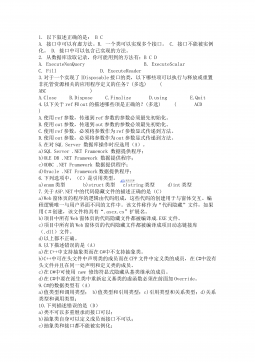
 2024-11-14 29
2024-11-14 29 -
产品需求文档 - 适合敏捷迭代开发的PRD文档应该怎么写VIP免费
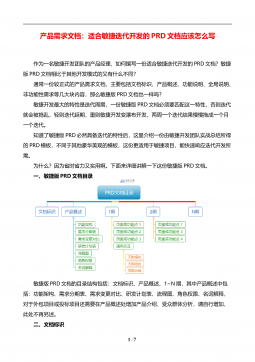
 2024-11-23 5
2024-11-23 5 -
产品需求文档 - 面向产品需求的验证管理VIP免费
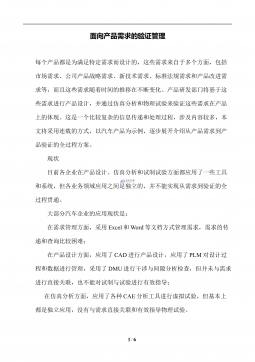
 2024-11-23 4
2024-11-23 4 -
产品需求文档 - 没有标准,只有沟通VIP免费
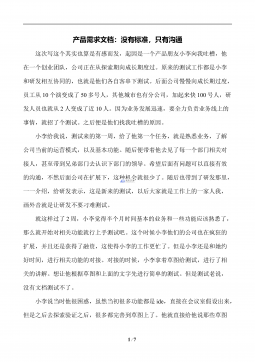
 2024-11-23 4
2024-11-23 4 -
产品需求文档 - 产品需求应该怎么写VIP免费
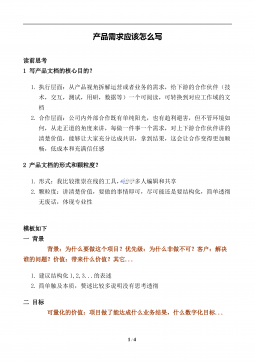
 2024-11-23 5
2024-11-23 5 -
产品需求文档 - 产品需求文档 PRD模板VIP免费

 2024-11-23 33
2024-11-23 33 -
产品需求文档 - 产品需求核心组件分析VIP免费
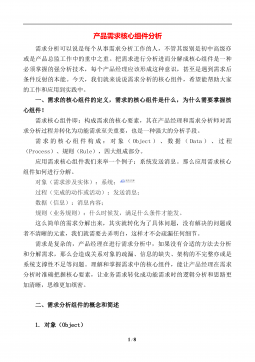
 2024-11-23 45
2024-11-23 45 -
2024版.新高考版.高考总复习.数学.5·3A版1_1集合VIP免费

 2024-11-23 29
2024-11-23 29 -
2024版.新高考版.高考总复习.数学.5·3A版1_1集合(分层集训)VIP免费

 2024-11-23 16
2024-11-23 16 -
产品需求文档 - 产品技能树之需求分析(一)VIP免费
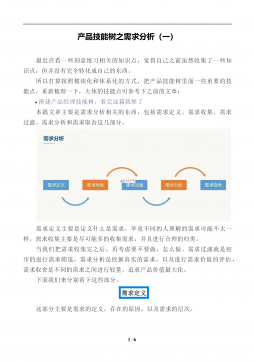
 2024-11-23 9
2024-11-23 9
分类:外语学习
价格:5.9玖币
属性:148 页
大小:390.11KB
格式:PDF
时间:2024-12-12




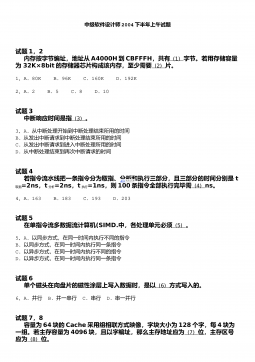
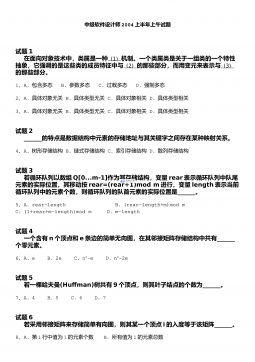
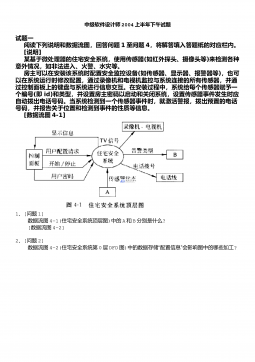
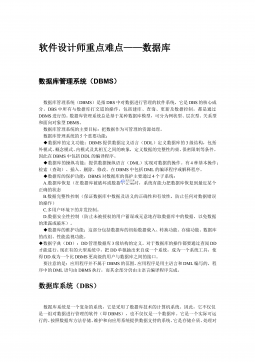
 渝公网安备50010702506394
渝公网安备50010702506394
